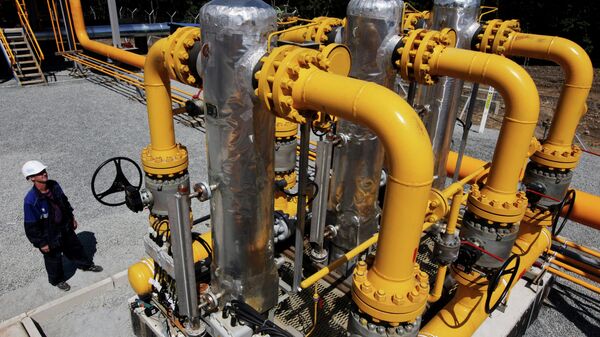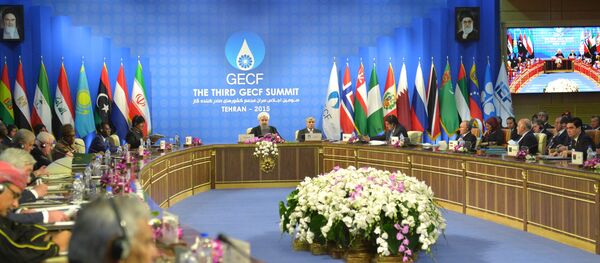MOSCOW (Sputnik) Anastasia Levchenko — Iran possesses the world's largest gas reserves of 34 trillion cubic meters and one of the largest oil reserves of 157.8 thousand million barrels, according to the experts of major global oil and gas company BP. At the same time, Tehran’s ability to affect the global energy markets was significantly limited by the international sanctions regime.
On Monday, Iranian President Hassan Rouhani said that Tehran was ready to increase the production and export of energy resources and to export them both to Asia and Europe after the lifting of the restrictions.
Alex Vatanka, analyst from the Middle East Institute told Sputnik that Tehran had the potential to become energy superpower, however its capabilities were significantly limited by the lack of foreign investments that would allow it to upgrade its facilities and to get to the export markets.
"The economy of Iran needs a lot of foreign investment, and without it the Iranian economy would never live up to its potential. First and foremost, Iran needs to create conditions for investments to come in," Vatanka said.
Vatanka added that Tehran should preserve the existing market share and regain the positions that were lost during the period when its economy was severely affected by the sanctions. He added that for Iran it was better to prioritize the list of partners to gain more political and economic benefits.
"Exporting gas to immediate markets – India, Pakistan, Turkey, Iraq – should be a priority," the Middle East researcher said, highlighting that Iran could become a major energy superpower if it solved the problems challenging its energy sector.
Paul Sullivan, a professor of economics at the National Defense University, told Sputnik that Iran had the possibility to increase the influence on global energy becoming a major competitor on the market of liquefied natural gas (LNG).
"Iran has massive natural gas reserves, especially offshore in a place called South Pars [natural gas field in the Persian Gulf located at Iranian territorial waters]. However, it could take many years and many tens of billions of dollars to develop them and set up LNG export capacity that would be needed," Sullivan said.
At the same time, he added that the competition at the energy markets, especially at LNG exports would grow and Iran should spend a lot of time and money to become part of that competition.
In July, Iran and the P5+1 group of world powers — Russia, the United States, China, France and the United Kingdom plus Germany — reached a deal to monitor and limit Tehran's nuclear program in exchange for the easing of restrictions, which opened the way for Iran to pursue energy projects.
In September, National Iranian Oil Company head Ali Kardor said he expected Iran’s oil exports to increase by 500,000 barrels a day by late November or December. Western sanctions were estimated to have cut Iran’s crude oil export revenue by almost half since 2011.




